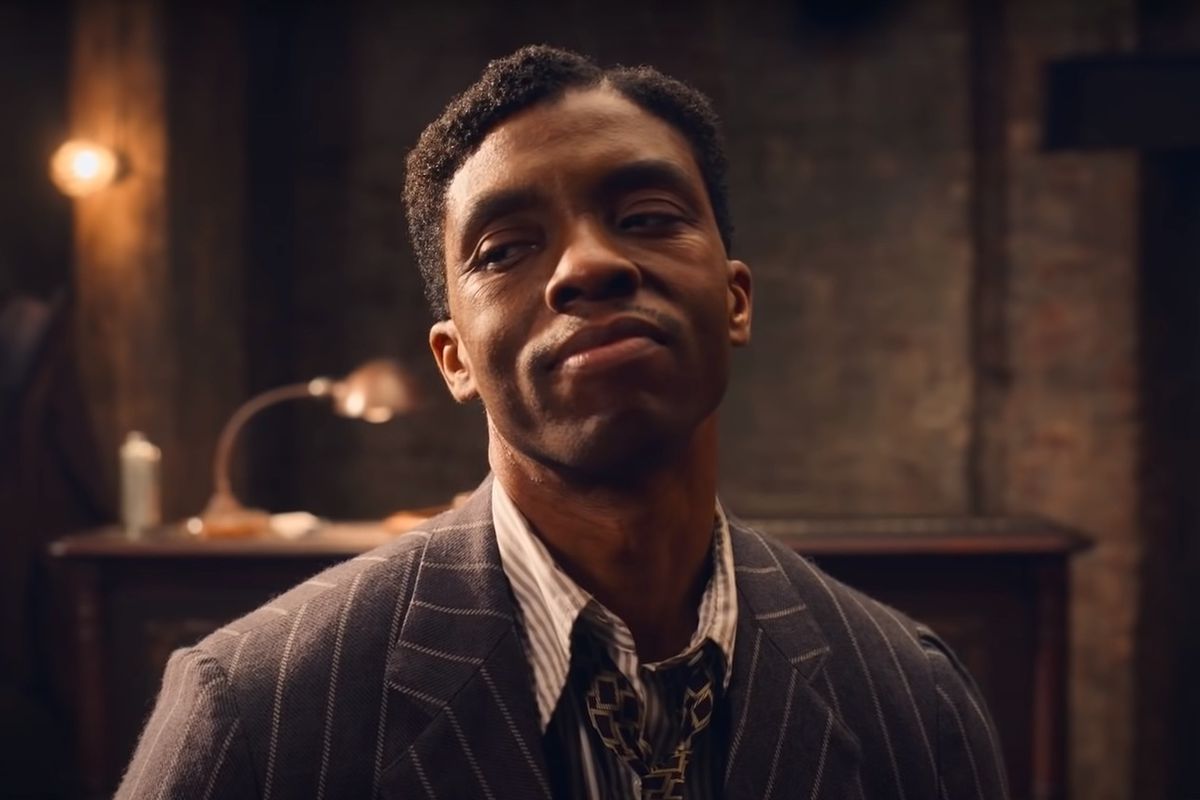Ma Rainey’s Black Bottom, an adaptation of the August Wilson play of the same name, is the final film appearance of Chadwick Boseman. The loss of such an enormously talented actor hangs over the film like a portent, silently inviting the viewer to gaze back on Boseman’s career in the rearview mirror. In the span of just five years, Boseman transcended from performer to symbol by stepping into the shoes of four iconic Black figures: Jackie Robinson, James Brown, Thurgood Marshall, and on the fictional end of things, the Black Panther—a superhero that shares a name with a movement far more radical and revolutionary than any of the corporate entities using the character. That disconnect between the producers and profiteers of Black art is, fittingly, a chief concern of Ma Rainey, which enriches and complicates Boseman’s body of work even as it’s laid to rest.
On the surface, Ma Rainey’s Black Bottom is about a fictional spat between real-life blues pioneer Gertrude “Ma” Rainey (Viola Davis) and her band’s precocious trumpet player, Levee (Boseman). At a recording session for Ma’s song “Ma Rainey’s Black Bottom” (a-ha!), Ma and Levee butt heads over what version of the song to play: Ma, a known control freak, wants to play the traditional version with a spoken intro from her nephew; Levee, who’s concerned with his career prospects above all, wants to play a new version with a trumpet intro from his truly. Stoking that fire’s flames are Sturdyvant, the record label’s owner, and Irvin, Ma’s manager, who both seem to favor Levee’s version. Add the final ingredient of Levee hitting on Ma’s girlfriend and that fire turns into a blaze.
The film looks hot to match, and not just because of the sweltering, summertime setting and attractive production design. Ma Rainey avoids the visual torpidity that bogged down Fences, the last August Wilson play adapted to film (directed by Denzel Washington with all the visual inventiveness of a camera pointed at a stage), by igniting its sets with a little kinetic energy. The sense that this story was written for the stage is still inevitable—most of the film takes place in one building; characters do a lot of talking and not a lot of moving—but director George C. Wolfe ensures that the camera’s gaze never lulls into a stare. The lens tends to look on from atypical angles, jumping around the room and maintaining enough distance from the actors to fill out the interior of the recording studio. The actual recording room, where Ma and her white business partners mingle, is very bright, very open. The practice room where the all-Black band warms up is cramped and dark. The visual emphasis on this discrepancy takes the intimacy of a chamber piece play—just you and the actors, hanging on every word that punctuates the silence—and puts it in a literal chamber, trapped, constricted, uncomfortable from any angle. If there’s one word to describe what Ma Rainey gains from the move to film, it’s claustrophobia.
Boseman’s Levee sees the walls closing in on him. He has a lot of monologues about “making it”, as it were—about being recognized for his musical genius and one day leading his own band. But the script, keeping August Wilson’s constant, simmering conflict intact, confronts Levee at every turn with the harsh truth of Black reality, dredging up both the inhumanity of white America and the impossible question of how the oppressed should navigate an economy of oppressors. Taking place in the first years of the Great Migration, when Black Americans were fleeing the racism of the South for the sometimes-less-overt racism of the North, Ma Rainey’s Black Bottom suggests that the escape from cotton field to practice chamber is a somewhat lateral move. White supervisors still have capital to extract from Black workers. It’s just that now, Black workers can be professional artists, so they need to feel a little freer in order to produce the goods. Boseman’s performance roils in the tension of that faux liberation, whipping between tempered hope and righteous anger like the winds of a tempest. It’s a formidable turn—the kind of performance that makes you miss the stage, where the world behind a monologue can freeze as the lights single out the speaker. The film version of Ma Rainey, still as much of an actors’ showcase, loses an important spark in not being able to provide that for Boseman.
The reigned-in reality of the screen is a snugger fit for Viola Davis’ Ma Rainey. She’s a stubborn and self-interested figure, and from Levee’s point of view, something of an antagonist. But the movie’s claustrophobic America contextualizes her as it crushes Levee, adding wrinkles to a face perennially exhausted and annoyed. Who does Ma have to be to succeed in a world that hates her? Who did Chadwick Boseman have to become to outdo a legacy that commodifies him? An unrelenting fighter—that’s the least we know.
★★★★ (4/5)




